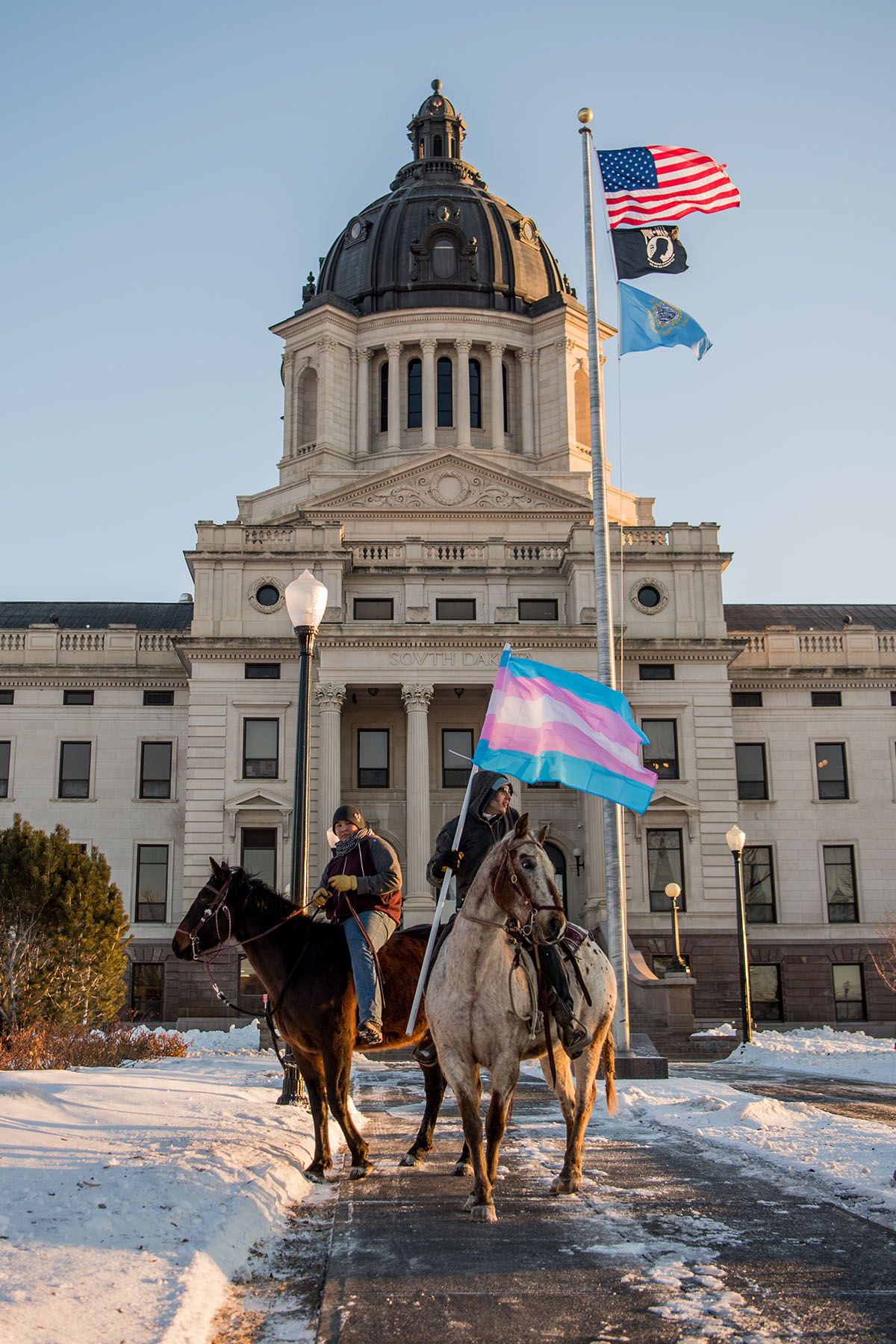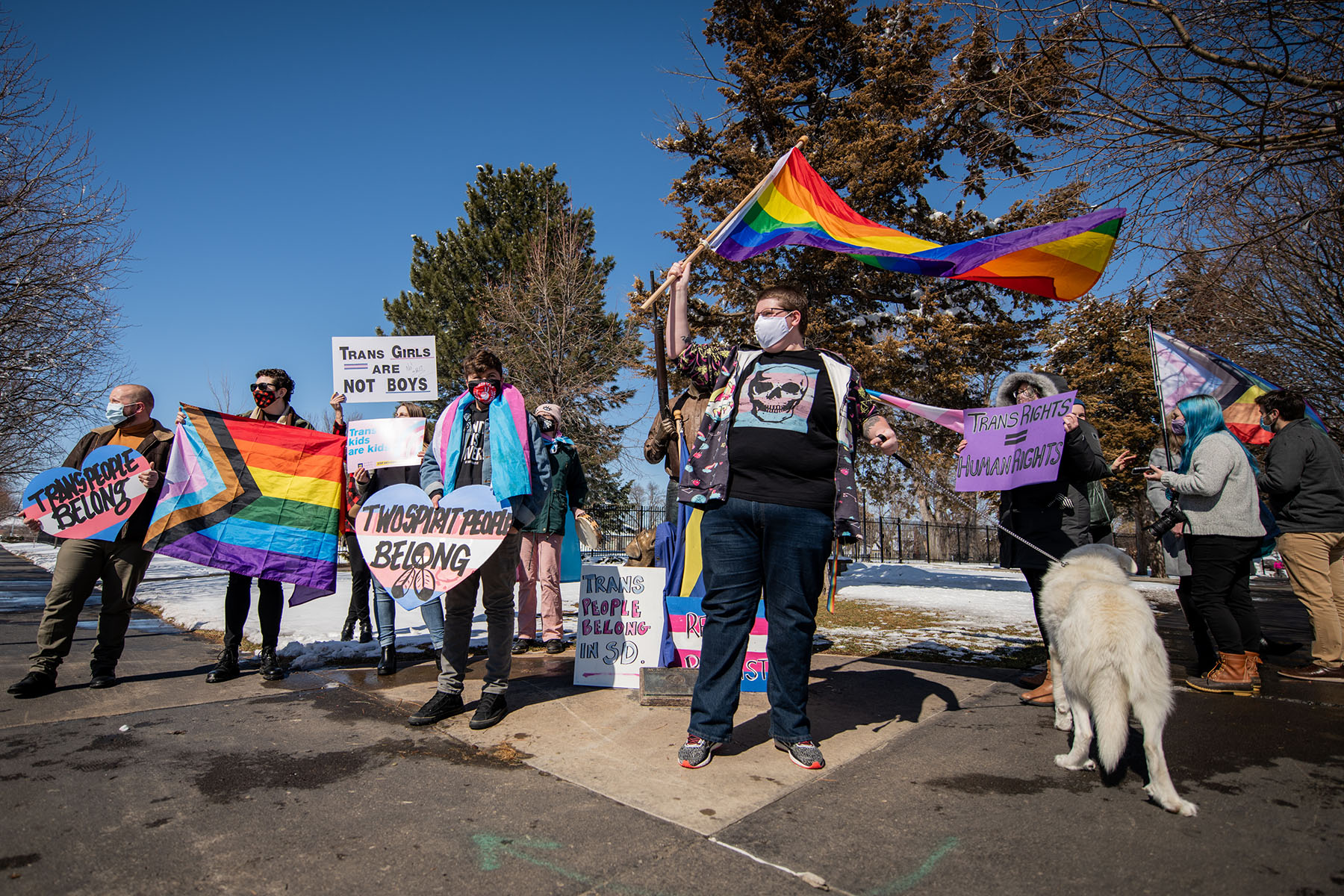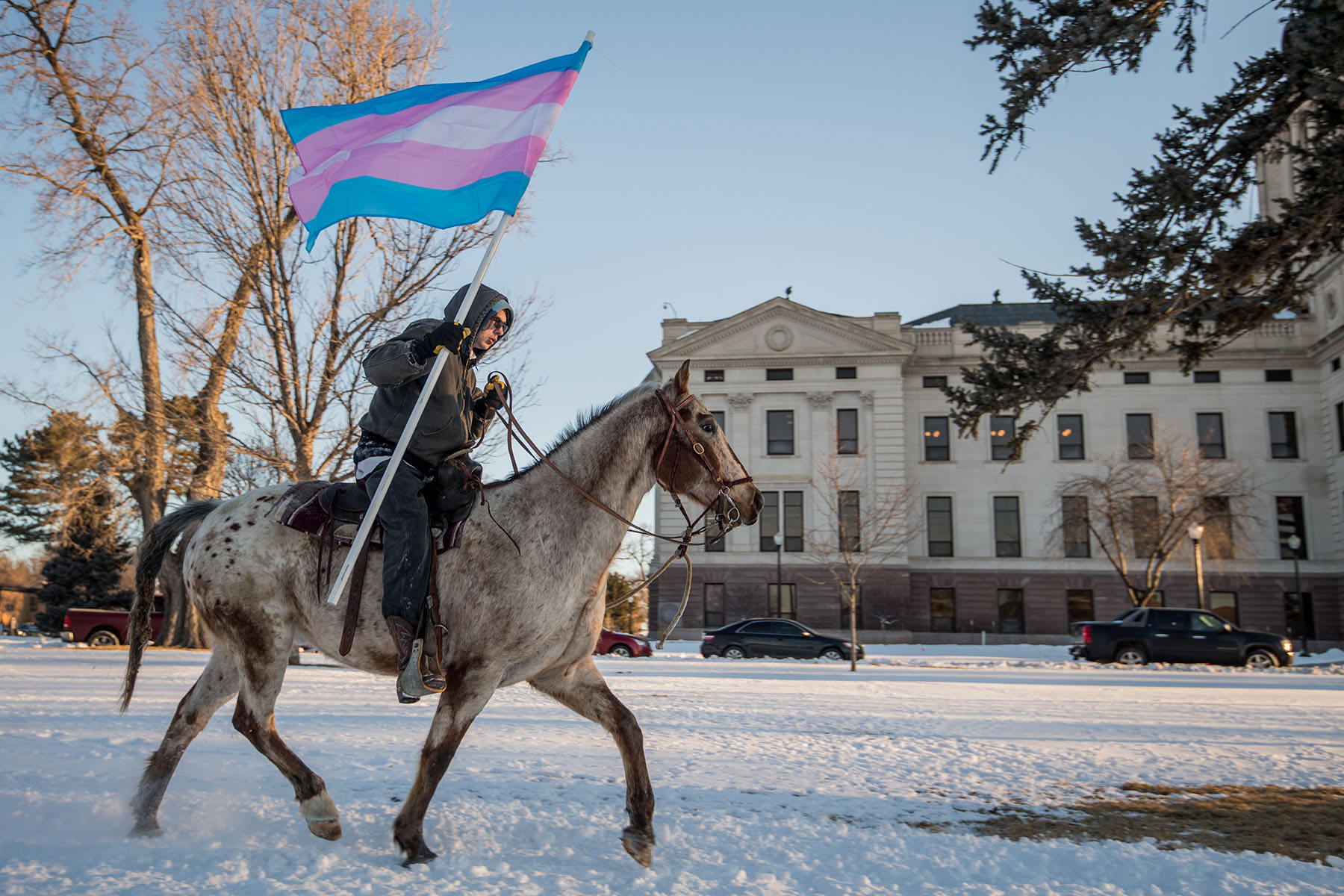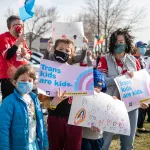At The 19th, we’re committed to publishing journalism that you can trust throughout the critical moments that shape our democracy and our lives. Show your support during our Fall Member Drive, and your donation will be matched. Double your gift today.
What most people remember about that February morning is the cold. The sun was just rising over Pierre, South Dakota. The temperature hovered at 17 degrees. The mood was tense and grim. What Dylan Daniels will never forget about that day is that everything changed for queer Indigenous people after that.
It was February 10, 2020, just weeks away from the COVID-19 pandemic shutting down statehouses and halting any legislation from moving forward. But on that day, the South Dakota legislature was poised to vote on House Bill 1057, a measure to ban gender-affirming care for youth. Dozens of bills just like this one had been introduced in other statehouses. South Dakota, with its deep red House and Senate and conservative governor, was seen as a bellwether. Passing HB 1057 would lay the groundwork for its many siblings nationwide.
The bill was deeply personal for Daniels, a two-spirit transgender man.
Daniels and other trans advocates, many of them children and their parents, had gotten up in the middle of the night to travel more than 200 miles from Sioux Falls to the capital of Pierre to protest the bill.
“With homemade signs and pride flags in hand, demonstrators marched up and down the front sidewalk of the capitol building, chanting the call and response slogan, ‘Represent, all of us!’ and cheering as supportive passerby cars honking their horns,” Daniels wrote in a recollection he would later share in the Storyteller Journal, a small independent media outlet, in Sioux Falls.
The small stretch of sidewalk next to the Capitol was mostly full of kids in puffy coats and their parents that morning. Passersby wouldn’t know it just by glancing at them, but most of the kids were transgender. Only people with something to lose had traveled this far in the dark to freeze on a sidewalk with a slogan in hand.
Daniels had invested heavily in organizing efforts for transgender youth, becoming a board member of The Transformation Project, which advocates for trans and nonbinary kids in the state.
Susan Williams, who founded the Transformation Project and has a transgender son, remembers the day as “the worst of times.” South Dakota had battled bill after bill targeting trans youth. It was wearing on the kids, she felt.
“Back then, our state really was first on debating these horrible bills,” Williams said recently.
The odds were stacked against them. The bill had already cleared the House. It was now barrelling toward the Senate. It would need to clear committee before a full vote, but many LGBTQ+ advocates felt that both could easily happen. Their only tactic was to surprise Republican lawmakers with impromptu meetings with transgender kids, on the off chance that would soften them before voting.
With so much pressure on South Dakota, national reporters had flocked to the small Capitol. The National Center for Transgender Equality bankrolled an out-of-state field organizer in the weeks leading up to the vote.

According to the Pew Research Center, 79 percent of South Dakotans identify as Christian. In many, but not all parts of the state, faith leaders had opposed transgender rights and dominated the airwaves. Often absent from the discussion about faith were the state’s nine Native tribes.
“I think a lot of people don’t realize how big the Native population is here,” Williams said. “And they have not been treated well over the years.”
Two-spirit is an umbrella term generally used to refer to Native people who have both “male” and “female” spirit within them. Today, many people might think of two-spirit people simply as trans, nonbinary or even queer. However, two-spirit is not limited to a person’s sexual orientation or gender and more broadly refers to a person’s soul and ceremonial role within their tribe.
History shows that two-spirit people were largely revered in their tribes before European settlers began enforcing strict gender rules. For Daniels, his own Wasé Wakpa community had come to internalize some of those rules. It wasn’t that he wasn’t loved or embraced. The older he got, the harder he found fitting in.
“Within those ceremonial teachings, and in my community, I went through a phase where I pulled back away from being involved because I couldn’t fit in any of the options,” he said.
-
More from The 19th
- Indigenous people unite to navigate abortion access after Roe
- Highest-ranking Indigenous woman in statewide office will lead Democratic Lieutenant Governors Association
- ‘Systematically erased’: Middle Eastern and North African women and LGBTQ+ Americans don’t see themselves in U.S. data
April Matson, a two-spirit person, works on youth music camps on the Pine Ridge and the Rosebud Reservations in South Dakota. Every year, Matson sees more youth changing their names and pronouns and exploring their gender expressions.
“Their parents or caretakers are just so supportive,” Matson said. “And it’s been this way for a long time since they were babies. There’s this big supportive community there.”
Matson grew up seeing Native people fight erasure and oppression. But neither Matson nor Daniels had seen their Indigenous communities come out for transgender equality before.
That morning in February was different. At the end of the sidewalk, in red and black jackets, two elders stood with bundles of herbs, a transgender pride flag and the flag for the Pine Ridge Indian Reservation. Members of the Oglala Sioux Tribe had come to protest the bill. They were not alone. Two-spirit people, their family and friends had trekked from across the state to protest HB 1057.
As the sun started to rise, a cheer echoed over the capitol grounds. Daniels would recall it as one of the most beautiful moments of his life.
“And suddenly, with a cry of, “Hoka hey!” two Native riders galloped across the capitol lawn on horseback,” he wrote.
One rider held up the transgender pride flag. It snapped in the wind. The kids and their parents shouted in delight. A photographer for the ACLU snapped a photo of the riders.

Tribes across the state showed up. They crowded into the committee room with banners and signs, the first visible Native protest to anti-trans bills the nation had seen. It wouldn’t be the last.
Matson, who was in Vermillion, four hours southeast of Pierre, watched the day unfold via social media updates and messages from Daniels, with whom they are raising kids.
“That was really incredible,” Matson said. “I hadn’t really even thought to start organizing in that way where we’re having these Indigenous two-spirit people showing up … like we’ve always been here and this is actually a really big part of our culture.”
Steph Viera, an associate producer at the indigenous-led NDN Collective based in Los Angeles, also followed the protest from afar. Viera had never seen such visible Native resistance in a rural location.
“It’s empowering to know that when I show up to a frontline or show up to a protest that I’m not alone,” he said. “As a trans masculine person, as a genderqueer person, I cross state lines a lot of the time for work. Naturally there’s an anxiety about how I will be perceived in the Western world.”
The moment in South Dakota reverberated throughout many tribal communities. For Daniels, it meant coming home in a new way. His own Lakota tribe welcomed him to participate in a ceremony for masculine people that he had long dreamed of. He has continued to participate in new ways that affirm him as a two-spirit person.
Viera also now works with youth in South Dakota. And Williams said her organization has benefited immensely from national support. Last year, the LGBTQ+ organization Way OUT Los Angeles granted Williams’ organization $158,000 to open a community center for transgender kids in South Dakota. The Prism Center opened in Sioux Falls in October, welcome news for many families with trans kids.
HB 1057 ultimately died in committee the day of the protest after Sen. Wayne Steinhauer was ambushed on the floor by a 16-year-old transgender constituent. But this year, the legislature passed a transgender youth health care ban. Gov. Kristi Noem signed it into law in February, the same day the Transformation Project had scheduled its gala.
“We all just wanted to stay home and curl up under a blanket and cry,” Williams said.

Instead, 250 people showed up to the gala. Anti-trans bills are passing, said advocates. But the community supporting transgender kids is growing more vocal, too. Native people, who have battled removal for generations, are now part of that fight.
“We’re in a time where we have folks coming out and reclaiming that term of two-spirit and stepping into those roles and finding ways that we can heal our people,” Viera said. “That’s something that I think that we’re working on as a community.”








